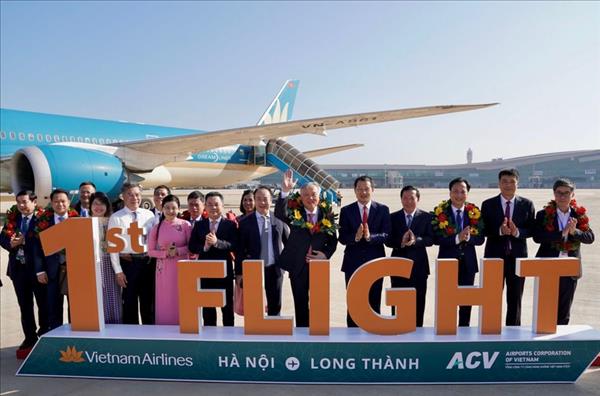Hanoi, September 11 (VNA) – Vietnam’s strong growth is likely to persist thanks to its young, ambitious, and business savvy population, said an article published by Singapore-based Channel News Asia.
The commentary, titled “Ambitious and smart, youths in Ho Chi Minh are building Asia’s Silicon Valley” by Stephanie Jones and Rafael Masters, said that Vietnam, for the last few years, has seen remarkably strong, continuous growth, averaging 6.15 percent each year since 2000.
Urbanisation and a growing middle class are fuelling economic growth and driving the creation of new commercial opportunities. 50 percent of the population have access to the internet and more than a third use smartphones, according to the article.
At the same time, Vietnam has become increasingly attractive for new investors, and local talent is developing rapidly, even as the country has to compete against Singapore, Hong Kong (China) and other regional stars.
In particular, Vietnam’s software industry is poised to become the Silicon Valley of Asia, especially through the aptly named 1.5 billion USD project Silicon City, located just outside Ho Chi Minh City.
Stephanie Jones and Rafael Masters shared the view that indeed, HCM City presents itself as the jewel in the crown of Vietnam’s success story.
They said as Vietnam’s largest and most progressive city, HCM City is the engine of the country’s growth. At a growth rate of 8.5 percent a year, HCM City has been transformed in the last ten years – with plans for a new airport in the pipeline in addition to a mushrooming central business district and a massive growth in waterfront developments.
HCM City is also the epicentre of the start-up scene in Vietnam, where most of Vietnam’s 3,000 start-ups operate. In May 2016, early-stage venture fund 500 startups pledged a further 10 million USD to their Vietnam fund. Other venture capital companies like CyberAgent, Ventures and SeedCom are also active and investing in new firms, the writers added.
HCM City has even produced one of Southeast Asia’s unicorns – game developer VNG which became the first Vietnamese technology company to hold an IPO in the US in June, and has more than 70 million users from Vietnam, Myanmar, Japan, the Republic of Korea and Malaysia on its chat app called Zalo alone.
Stephanie Jones and Rafael Masters said that HCM City’s start-up scene may involve new and emerging technology, but at its core is a story about people.
Over the past ten years, thousands of young, aspiring Vietnamese entrepreneurs have moved into the city to create their own start-ups – many of which are in developing tech solutions including e-commerce platforms, apps and games.
Coworking spaces and cafes also have sprung up all across the city to meet the demands of a class of entrepreneurs who network frequently and work in small groups without a dedicated office space, they explained.
The start-up scene owes its success in part due to the strong push by the Vietnamese government. Officials have promised financial support of 90 million USD to more than 2,000 local hi-tech start-ups, and made plans to set up innovation hubs that provide training programmes, legal consulting and networking activities to connect start-ups with universities and research centres.
They stressed that but the key differentiator that makes Vietnam's start-up scene particularly vibrant is the quality of the Vietnamese people working in that sector.
Vietnamese talent is internationally competitive, increasingly well-educated, mobile and tech-savvy.
Vietnam has a high literacy rate of 94.5 percent and OECD studies have placed Vietnam 17th out of 65 countries on PISA tests. The Government promises to improve the academic qualifications and business capabilities of its workforce seem to be bearing fruit. Education also continues to make up 20 percent of Government spending.
Vietnamese college and university students have been scoring very highly in internationally ranked tests in recent years, offering a pool of skilled labour for prospective entrepreneurs.
Many young Vietnamese are also sent overseas to study and return with grand ideas of starting their own companies. An estimated 21,000 Vietnamese students attended American universities last year, the sixth largest number of foreign students in the US.
Stephanie Jones and Rafael Masters said the students they have encountered in their work in HCM City are smart, bright and spunky.
Unlike developed countries like Singapore, Vietnam is experiencing the dividends of a population boom. 70 percent of the population of Vietnam is under 30, and Vietnamese youths are highly ambitious and internationally-minded, they commented.
They take ideas like the transport sharing economy Grab and Uber introduced, and try to implement them in a way more suited to the Vietnamese market.
Young and well-educated Vietnamese born overseas are returning in droves and adding to the pool of talent.
Even though Vietnam is attracting ambitious young executives from all over Asia, many say they find it hard to compete with bright and savvy local talent, according to the article.
Young Vietnamese are able to focus on building strong start-ups because they also enjoy family support: Vietnamese family units typically consist of three generations living in a single house. Without a pension system, children take care of parents in old age and grandparents provide childcare and support while young parents are out working.
This strong family nucleus has been a source of support and safety net for young Vietnamese executives. They can devote more time and energy to their businesses, secure in the knowledge that they can turn to their parents to manage the household and not worry about childcare.
In this respect, Vietnamese talent with families have a huge advantage over those in other countries, and even over expatiates living on their own in Vietnam, they said.
All things considered, Vietnam is in a sweet spot now. Its ease of doing business is on par with China and recruitment demand is up 32 percent.
Strong growth is likely to persist, the article said, citing the World Bank’s statistics as saying that Vietnam’s economy could expand at an average of 6.3 percent in the next three years.
With a young, ambitious and business savvy-Vietnamese population, it is not hard to see why, it concluded.
The commentary, titled “Ambitious and smart, youths in Ho Chi Minh are building Asia’s Silicon Valley” by Stephanie Jones and Rafael Masters, said that Vietnam, for the last few years, has seen remarkably strong, continuous growth, averaging 6.15 percent each year since 2000.
Urbanisation and a growing middle class are fuelling economic growth and driving the creation of new commercial opportunities. 50 percent of the population have access to the internet and more than a third use smartphones, according to the article.
At the same time, Vietnam has become increasingly attractive for new investors, and local talent is developing rapidly, even as the country has to compete against Singapore, Hong Kong (China) and other regional stars.
In particular, Vietnam’s software industry is poised to become the Silicon Valley of Asia, especially through the aptly named 1.5 billion USD project Silicon City, located just outside Ho Chi Minh City.
Stephanie Jones and Rafael Masters shared the view that indeed, HCM City presents itself as the jewel in the crown of Vietnam’s success story.
They said as Vietnam’s largest and most progressive city, HCM City is the engine of the country’s growth. At a growth rate of 8.5 percent a year, HCM City has been transformed in the last ten years – with plans for a new airport in the pipeline in addition to a mushrooming central business district and a massive growth in waterfront developments.
HCM City is also the epicentre of the start-up scene in Vietnam, where most of Vietnam’s 3,000 start-ups operate. In May 2016, early-stage venture fund 500 startups pledged a further 10 million USD to their Vietnam fund. Other venture capital companies like CyberAgent, Ventures and SeedCom are also active and investing in new firms, the writers added.
HCM City has even produced one of Southeast Asia’s unicorns – game developer VNG which became the first Vietnamese technology company to hold an IPO in the US in June, and has more than 70 million users from Vietnam, Myanmar, Japan, the Republic of Korea and Malaysia on its chat app called Zalo alone.
Stephanie Jones and Rafael Masters said that HCM City’s start-up scene may involve new and emerging technology, but at its core is a story about people.
Over the past ten years, thousands of young, aspiring Vietnamese entrepreneurs have moved into the city to create their own start-ups – many of which are in developing tech solutions including e-commerce platforms, apps and games.
Coworking spaces and cafes also have sprung up all across the city to meet the demands of a class of entrepreneurs who network frequently and work in small groups without a dedicated office space, they explained.
The start-up scene owes its success in part due to the strong push by the Vietnamese government. Officials have promised financial support of 90 million USD to more than 2,000 local hi-tech start-ups, and made plans to set up innovation hubs that provide training programmes, legal consulting and networking activities to connect start-ups with universities and research centres.
They stressed that but the key differentiator that makes Vietnam's start-up scene particularly vibrant is the quality of the Vietnamese people working in that sector.
Vietnamese talent is internationally competitive, increasingly well-educated, mobile and tech-savvy.
Vietnam has a high literacy rate of 94.5 percent and OECD studies have placed Vietnam 17th out of 65 countries on PISA tests. The Government promises to improve the academic qualifications and business capabilities of its workforce seem to be bearing fruit. Education also continues to make up 20 percent of Government spending.
Vietnamese college and university students have been scoring very highly in internationally ranked tests in recent years, offering a pool of skilled labour for prospective entrepreneurs.
Many young Vietnamese are also sent overseas to study and return with grand ideas of starting their own companies. An estimated 21,000 Vietnamese students attended American universities last year, the sixth largest number of foreign students in the US.
Stephanie Jones and Rafael Masters said the students they have encountered in their work in HCM City are smart, bright and spunky.
Unlike developed countries like Singapore, Vietnam is experiencing the dividends of a population boom. 70 percent of the population of Vietnam is under 30, and Vietnamese youths are highly ambitious and internationally-minded, they commented.
They take ideas like the transport sharing economy Grab and Uber introduced, and try to implement them in a way more suited to the Vietnamese market.
Young and well-educated Vietnamese born overseas are returning in droves and adding to the pool of talent.
Even though Vietnam is attracting ambitious young executives from all over Asia, many say they find it hard to compete with bright and savvy local talent, according to the article.
Young Vietnamese are able to focus on building strong start-ups because they also enjoy family support: Vietnamese family units typically consist of three generations living in a single house. Without a pension system, children take care of parents in old age and grandparents provide childcare and support while young parents are out working.
This strong family nucleus has been a source of support and safety net for young Vietnamese executives. They can devote more time and energy to their businesses, secure in the knowledge that they can turn to their parents to manage the household and not worry about childcare.
In this respect, Vietnamese talent with families have a huge advantage over those in other countries, and even over expatiates living on their own in Vietnam, they said.
All things considered, Vietnam is in a sweet spot now. Its ease of doing business is on par with China and recruitment demand is up 32 percent.
Strong growth is likely to persist, the article said, citing the World Bank’s statistics as saying that Vietnam’s economy could expand at an average of 6.3 percent in the next three years.
With a young, ambitious and business savvy-Vietnamese population, it is not hard to see why, it concluded.
VNA/VNP

















